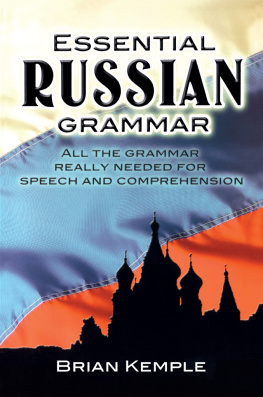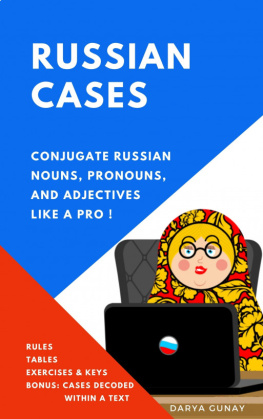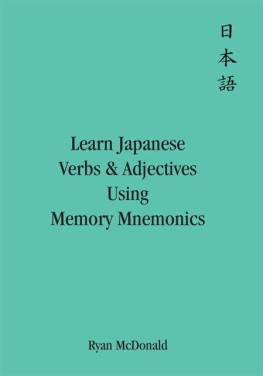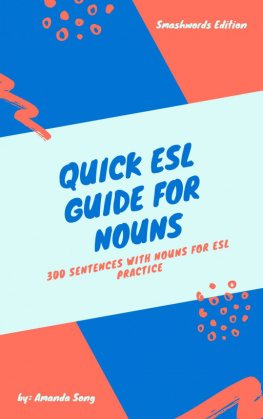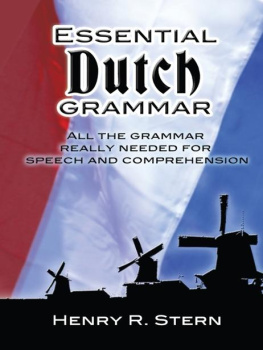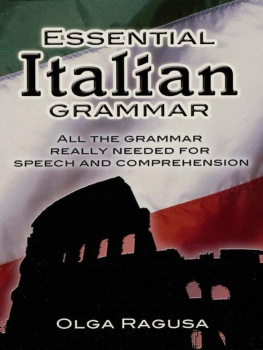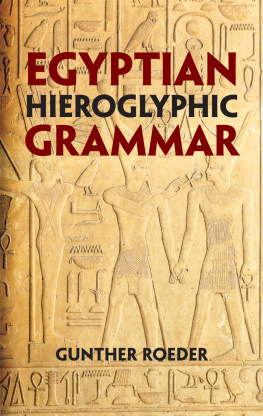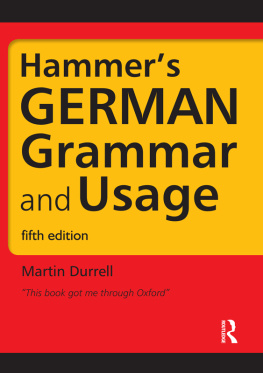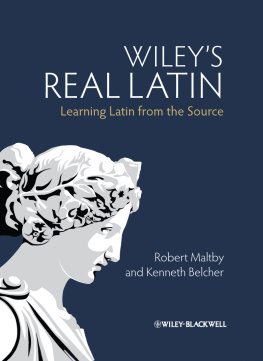ESSENTIAL
RUSSIAN
GRAMMAR
ESSENTIAL
RUSSIAN
GRAMMAR
BRIAN KEMPLE
DOVER PUBLICATIONS, INC.
NEW YORK
Copyright
Copyright 1993 by Dover Publications, Inc.
All rights reserved.
Bibliographical Note
Essential Russian Grammar is a new work, first published by Dover Publications, Inc., in 1993.
Library of Congress Cataloging-in-Publication Data
Kemple, Brian.
Essential Russian grammar / Brian Kemple.
p. cm.
Includes index.
ISBN-13: 978-0-486-27375-4 (pbk.)
ISBN-10: 0-486-27375-X (pbk.)
1. Russian languageGrammar. 2. Russian languageSelf-instruction. I. Title. PG2112.K45 1993
491.782421 dc20
92-20999
CIP
Manufactured in the United States by Courier Corporation
27375X09
www.doverpublications.com
CONTENTS
INTRODUCTION
Essential Russian Grammar assumes that you have a limited amount of time at your disposal to study Russian and that your objective is simple everyday communication, both spoken and written. This book, therefore, does not attempt to offer a complete outline of all aspects of Russian grammar, even in a highly condensed version. It does, however, offer a series of aids to help you use more effectively phrases and words that you have already learned. The book will introduce you to the most common structures and forms of Russian and a selected number of the most useful rules.
HOW TO STUDYESSENTIAL RUSSIAN GRAMMAR
If you have already studied Russian in a conventional manner, this book will serve as a review, and you can use it by glancing through all of it quickly and then selecting those areas on which you wish to concentrate.
If, however, this is your first acquaintance with Russian grammar, the following suggestions may be of help:
. Before beginning to work your way through this book, master several hundred useful phrases and expressions such as you will find in any good phrase book or in the Listen & Learn Russian course. The material in this book will be much more easily understood after you have achieved some simple working knowledge of the language. This books purpose is to enable you to gain greater fluency once you have learned phrases and expressions, not to teach you to construct sentences from rules and vocabulary.
. Read through Essential Russian Grammar at least once in its entirety. Do not be concerned if some of the material is not immediately clear; what appears to be discouragingly complex on first reading will become much simpler as you progress in your study. The first reading is necessary to acquaint you with the terms and concepts used from the beginning. Learning these will help you improve your comprehension of Russian and use more freely the expressions and words you already know. As you use Russian and hear it spoken, many of its grammatical patterns will become familiar to you. Essential Russian Grammar helps you discover these patterns, and it will be helpful to you as you develop your vocabulary and improve your comprehension.
. Go back to this book periodically. Sections that at first seem difficult or of doubtful benefit may prove extremely helpful as you progress further.
. For the most part, Essential Russian Grammar follows a logical order, taking up the major divisions of grammar in sequence. You will do best to follow this order. However, you may be one of those who learn best when they study to answer an immediate question or need (e.g., how to form the comparative of adjectives; how to express the future tense; etc.). If you are such a student, turn to the section that interests you at the moment, but read through the entire section and not just an isolated part. Individual remarks, taken out of context, are easily misunderstood and may seriously mislead you.
. Examples are given for every rule. It will be helpful if you memorize them. If you learn all of the examples in Essential Russian Grammar, you will have encountered the basic difficulties of Russian and studied models for their solution.
. You cannot study Russian or any other language systematically without an understanding of grammar, and the use and understanding of grammatical terms is as essential as a knowledge of certain mechanical terms when you learn to drive a car. If your knowledge of grammatical terms is a little hazy, read the Glossary of Grammatical Terms () and refer to it whenever necessary.
In Russian, as in any language, there are potentially many ways to express a single idea. Some involve simple constructions, others more difficult ones. Some of the more difficult constructions may well be more sophisticated ways of conveying the thought and ones that you will ultimately wish to master, but during your first experiments in communication in Russian, you can achieve your aim by using a simple construction. Be satisfied at first with the simplest.
You should not, however, be afraid of making mistakes. The purpose of this book is not to teach you to speak like a native but to allow you to communicate and be understood. If you pay attention to what youre doing, you will find that eventually you make fewer and fewer errors. Sooner or later youll be able to review Essential Russian Grammar or a more detailed book at a time that is appropriate for polishing your speech.
As you begin to speak Russian, you will be your own best judge of those areas where you need most help. If there is no one with you, you can practice by speaking mentally to yourself. In the course of the day see how many simple thoughts that you have expressed in English you are able to turn into Russian. This kind of experimental self-testing will give direction to your study of Russian. Remember that your purpose in studying this course is not to pass an examination or receive a certificate, but to communicate with others on a simple but useful level. Essential Russian Grammar should not be thought of as the equivalent of a formal course of study at a university. Although it could serve as a useful supplement to such a course, its primary aim is to help adults study on their own. Of course, no self-study or academic course, or even series of courses, will ever be ideally suited to all students. You must rely on and be guided by your own rate of learning and your own requirements and interests.
SUGGESTIONS FOR VOCABULARY BUILDING
. Study words and word lists that answer real and immediate personal needs. If you are planning to travel in the near future, your motivation and orientation are clear-cut, and Listen & Learn Russian or another good travel phrase book will provide you with the material you need. Select material according to your personal interests and requirements. Even if you do not plan to travel to Russia in the near future, you will probably learn more quickly by imagining yourself in a travel situation.
. Memorize by association. Phrase books usually give associated word lists. If you use a dictionary, dont memorize words at random but words that are related in some fashion.
. Study the specialized vocabulary of your profession, business or hobby. For example, if you are interested in mathematics, learn the wide vocabulary in that discipline. You will quickly learn words in your own specialty and a surprising amount will be applicable or transferable to other areas. Although specialized vocabularies may not always be readily available, an active interest and a good dictionary will help you get started.
LIST OF ABBREVIATIONS
The following abbreviations are used in Essential Russian Grammar:
Acc. | Accusative case |
Adj. | Adjective |
Anim. | |
Next page
